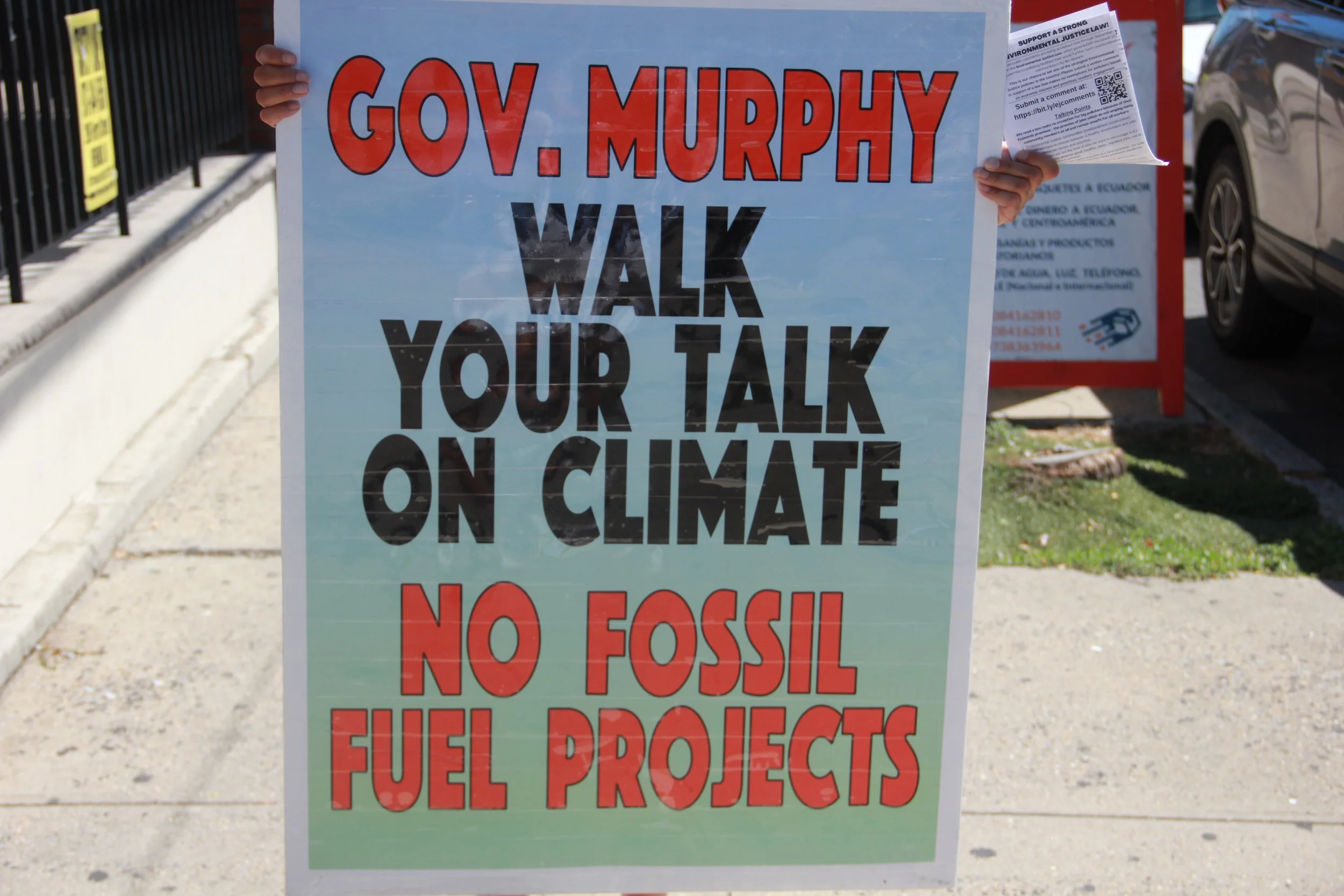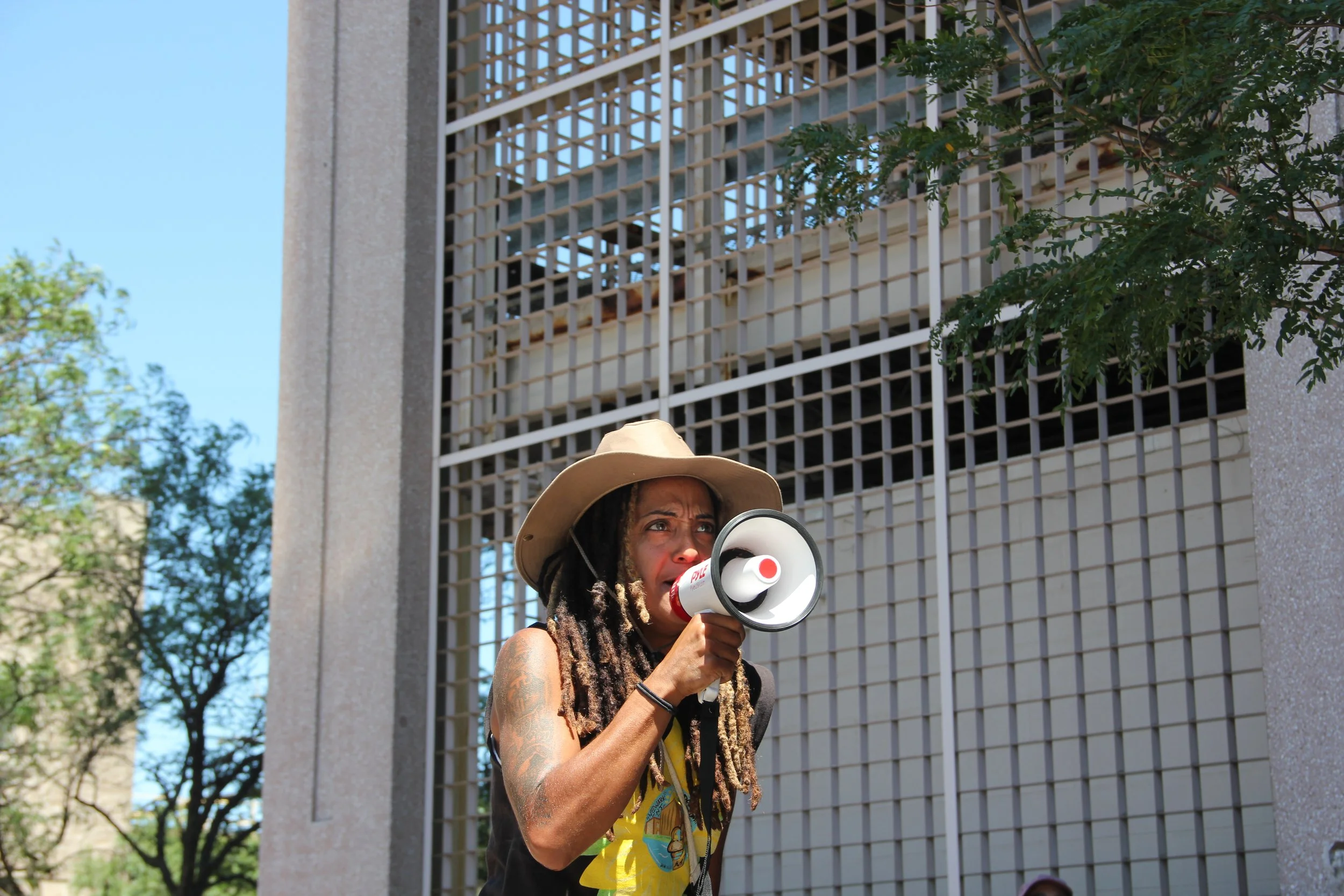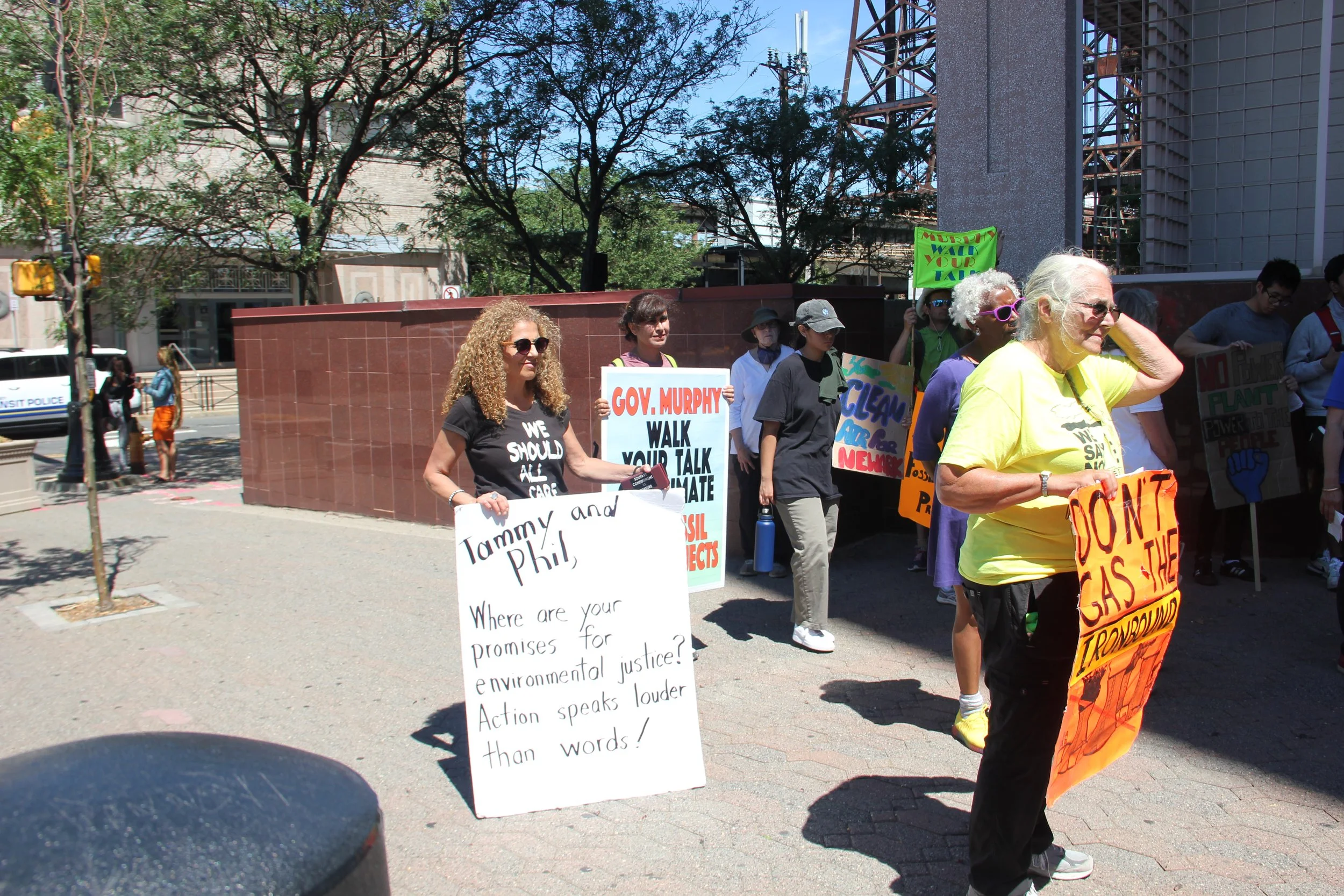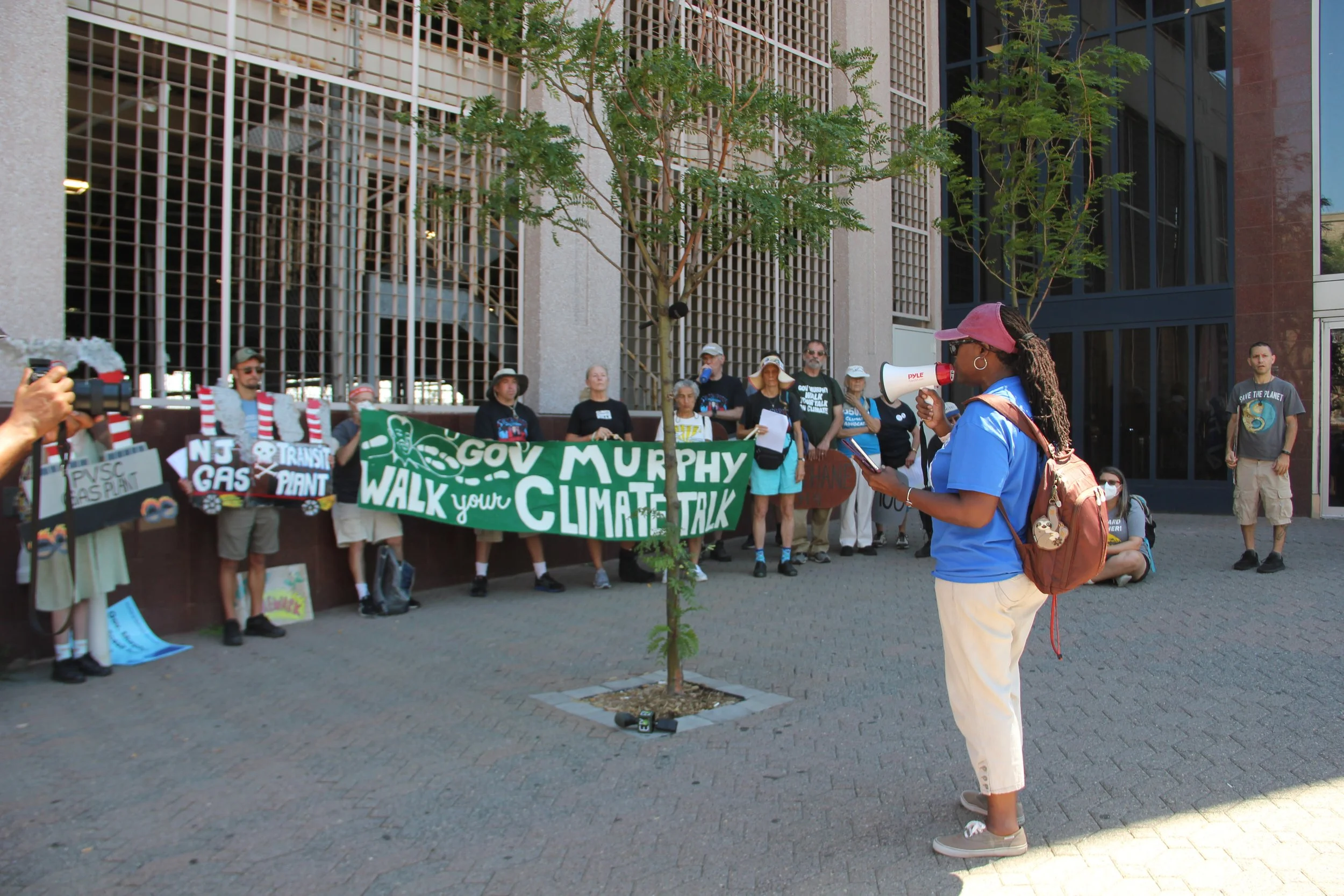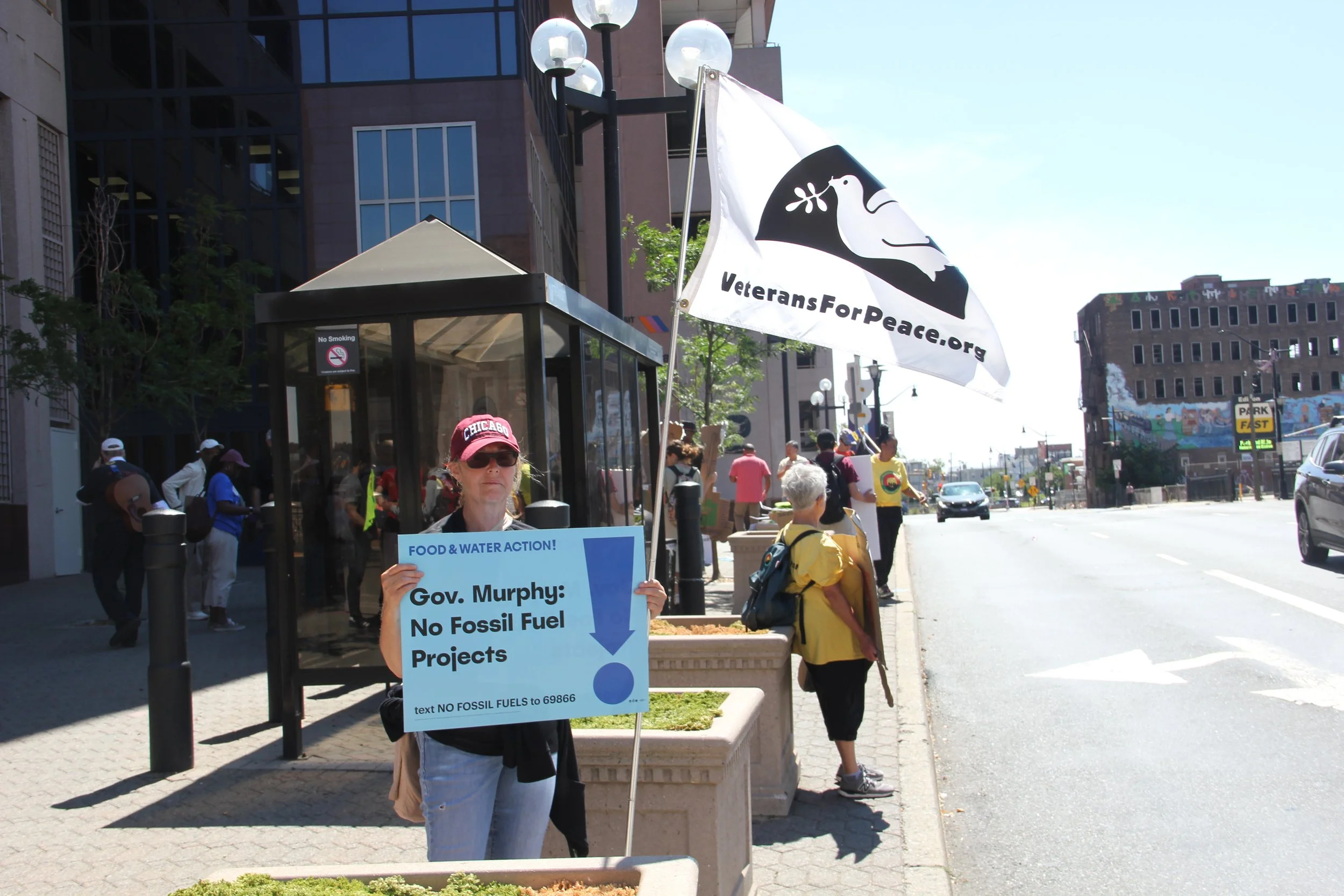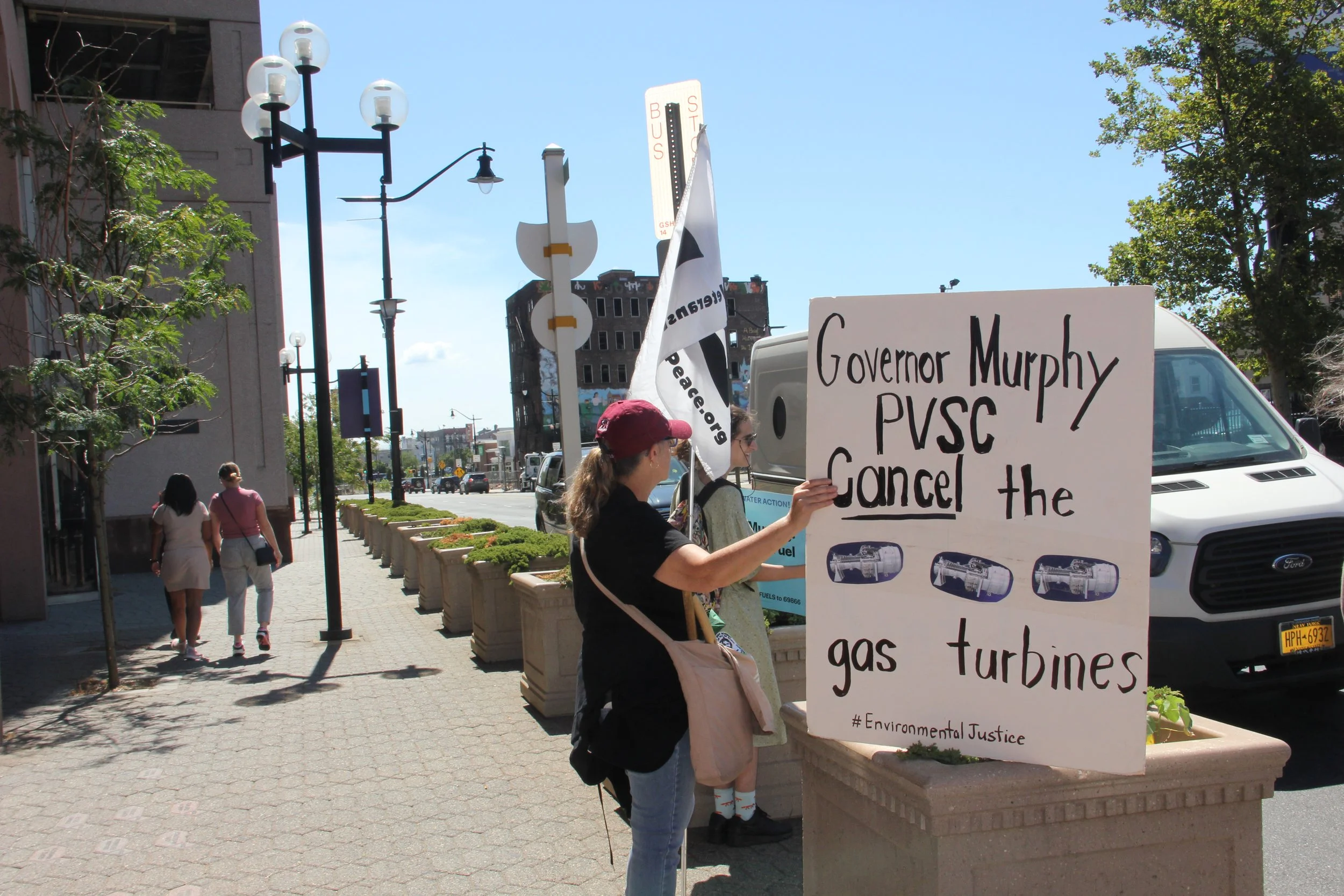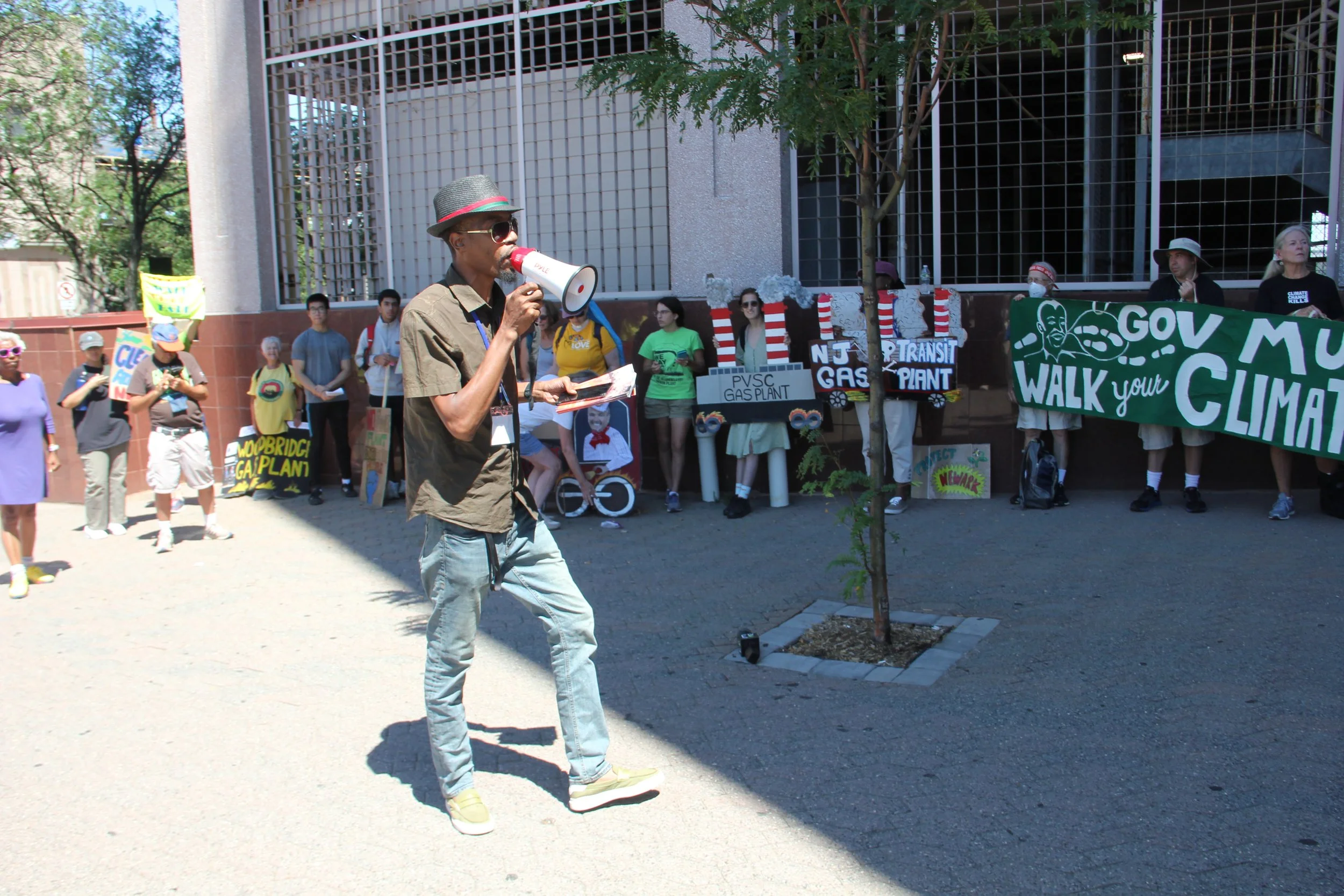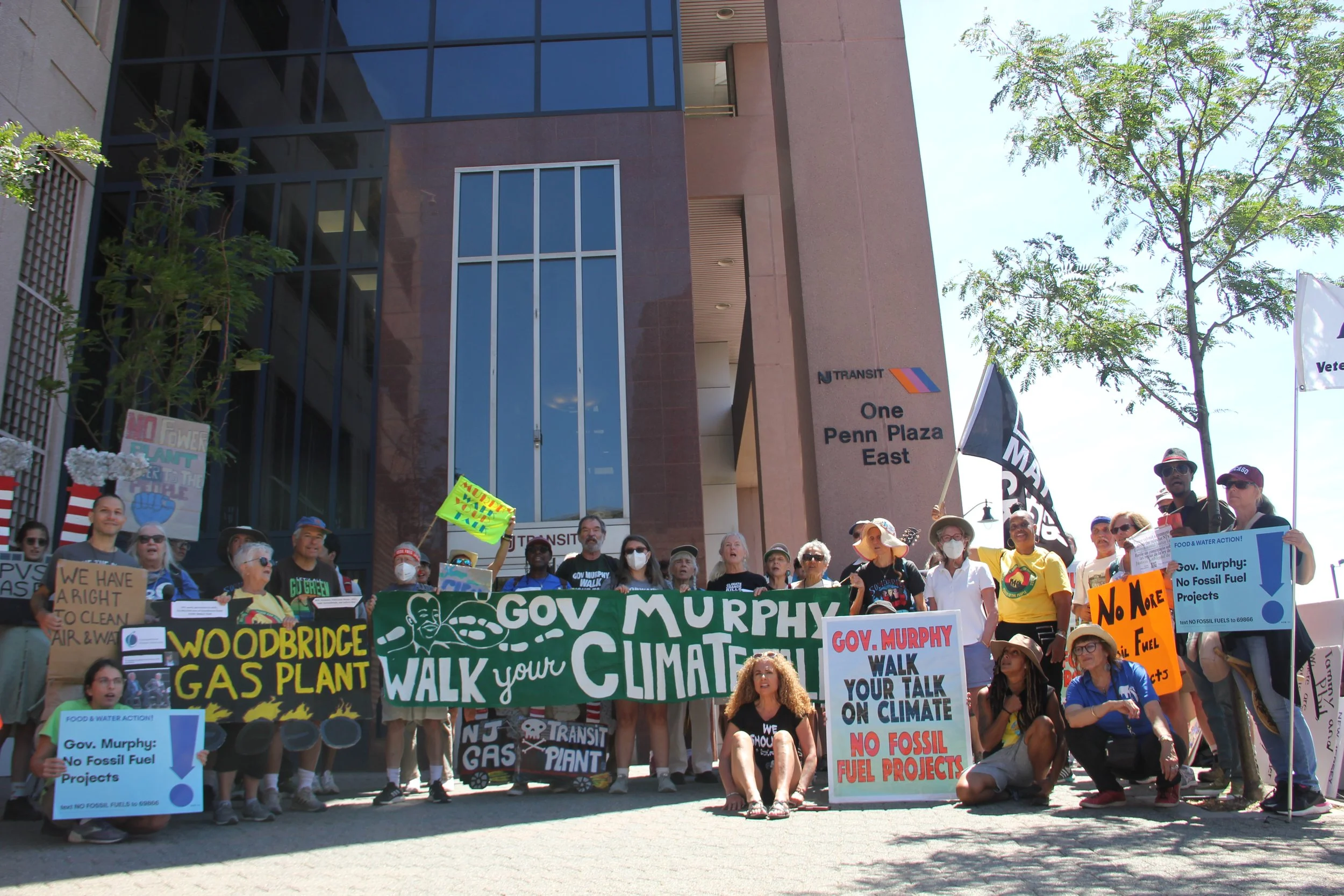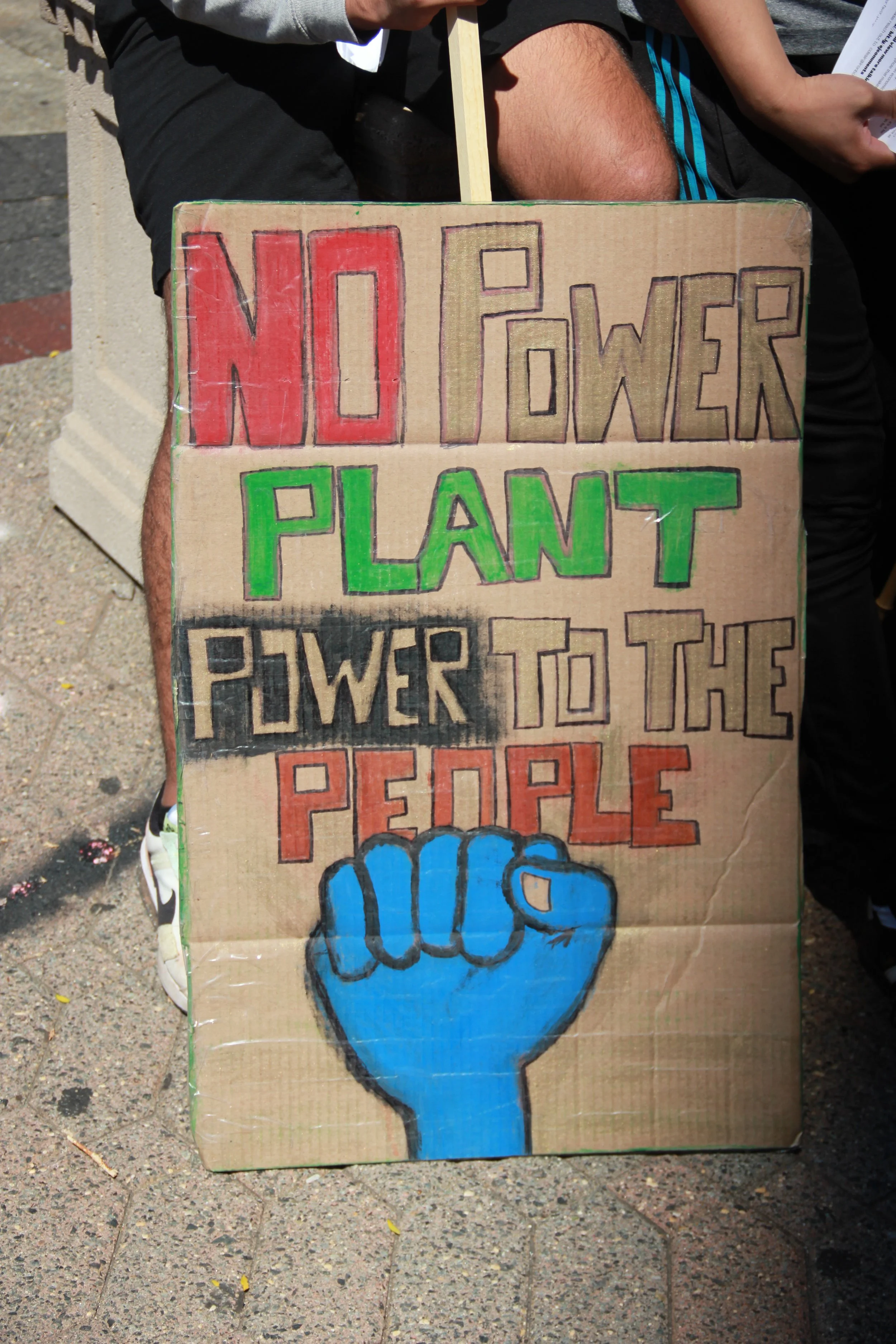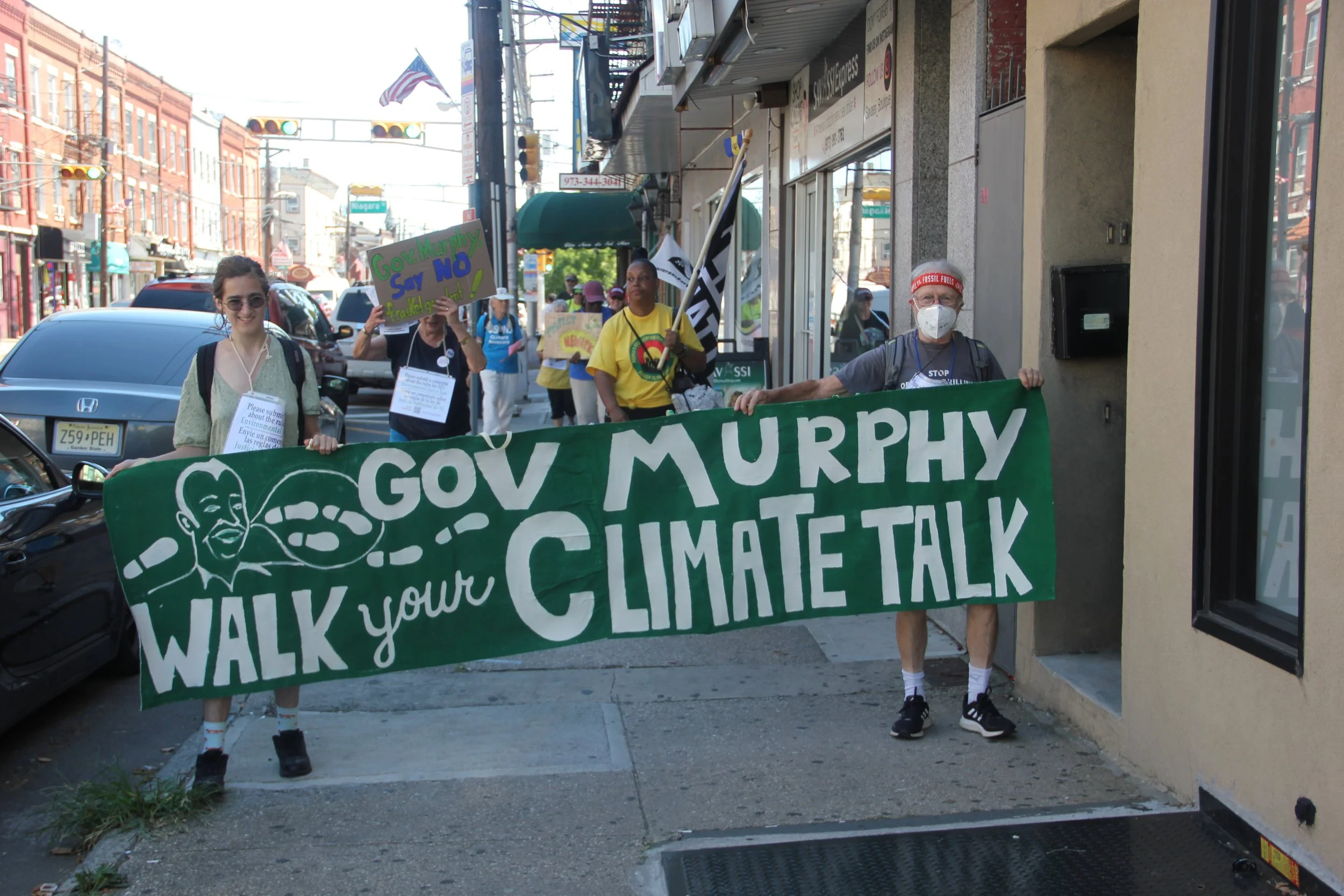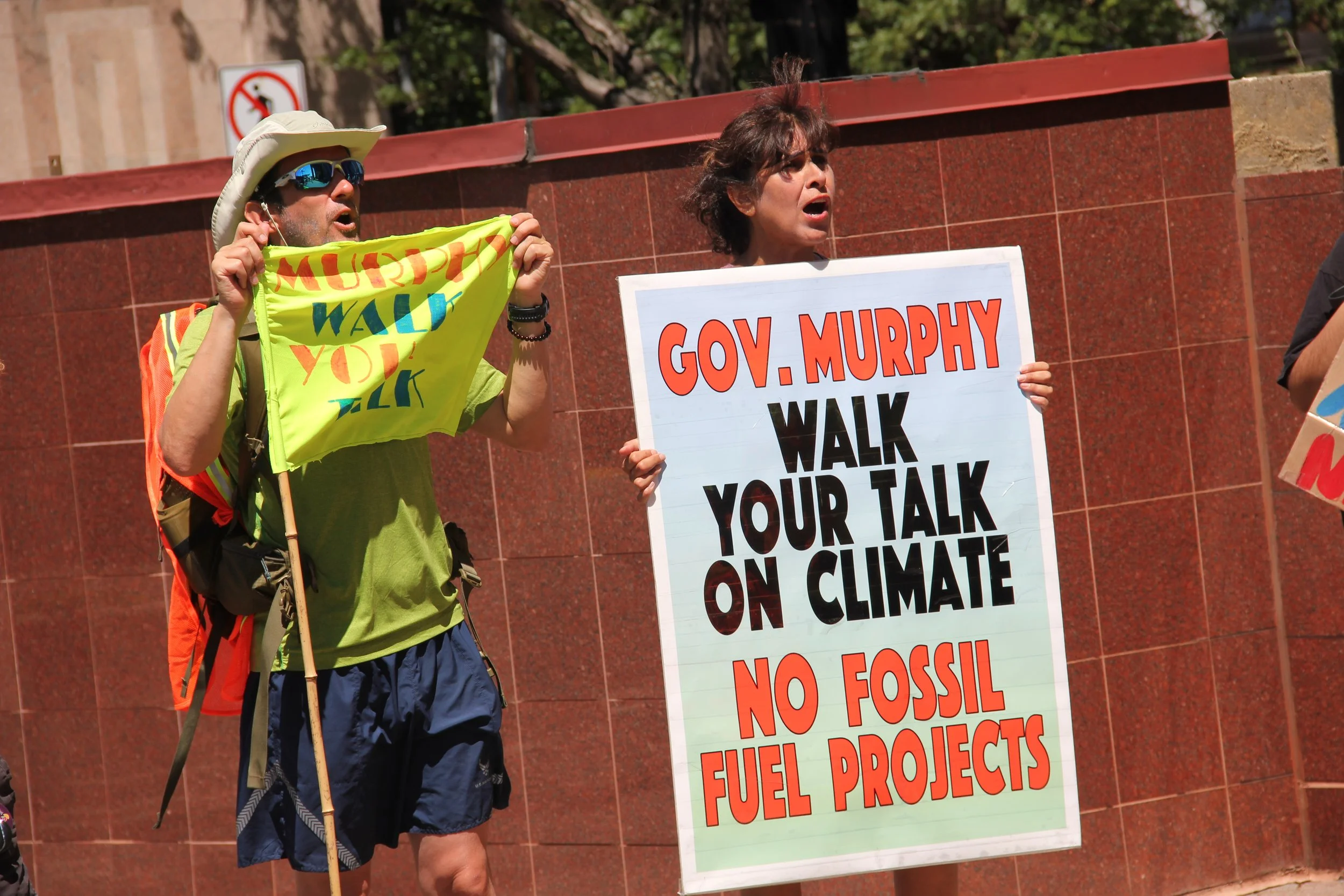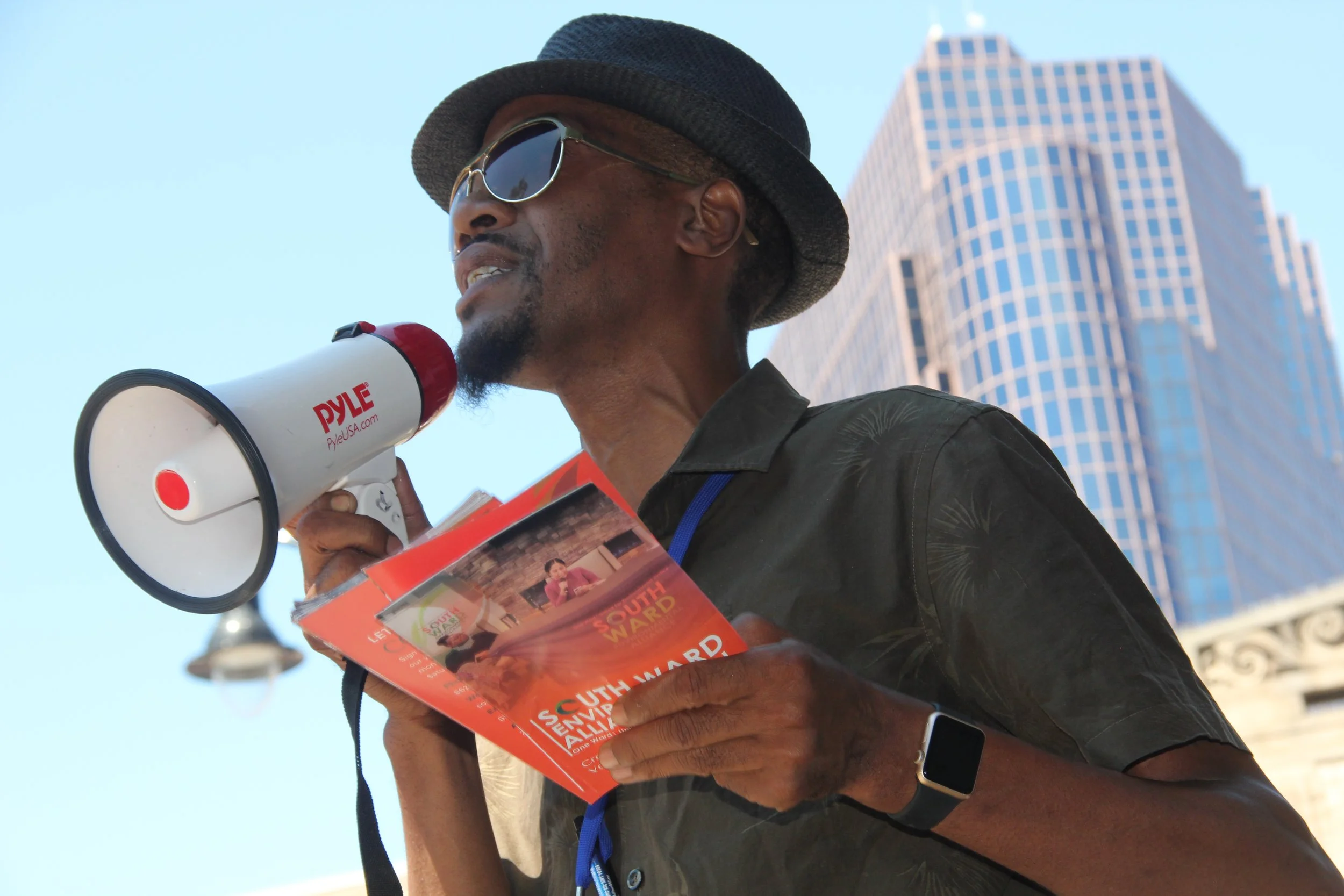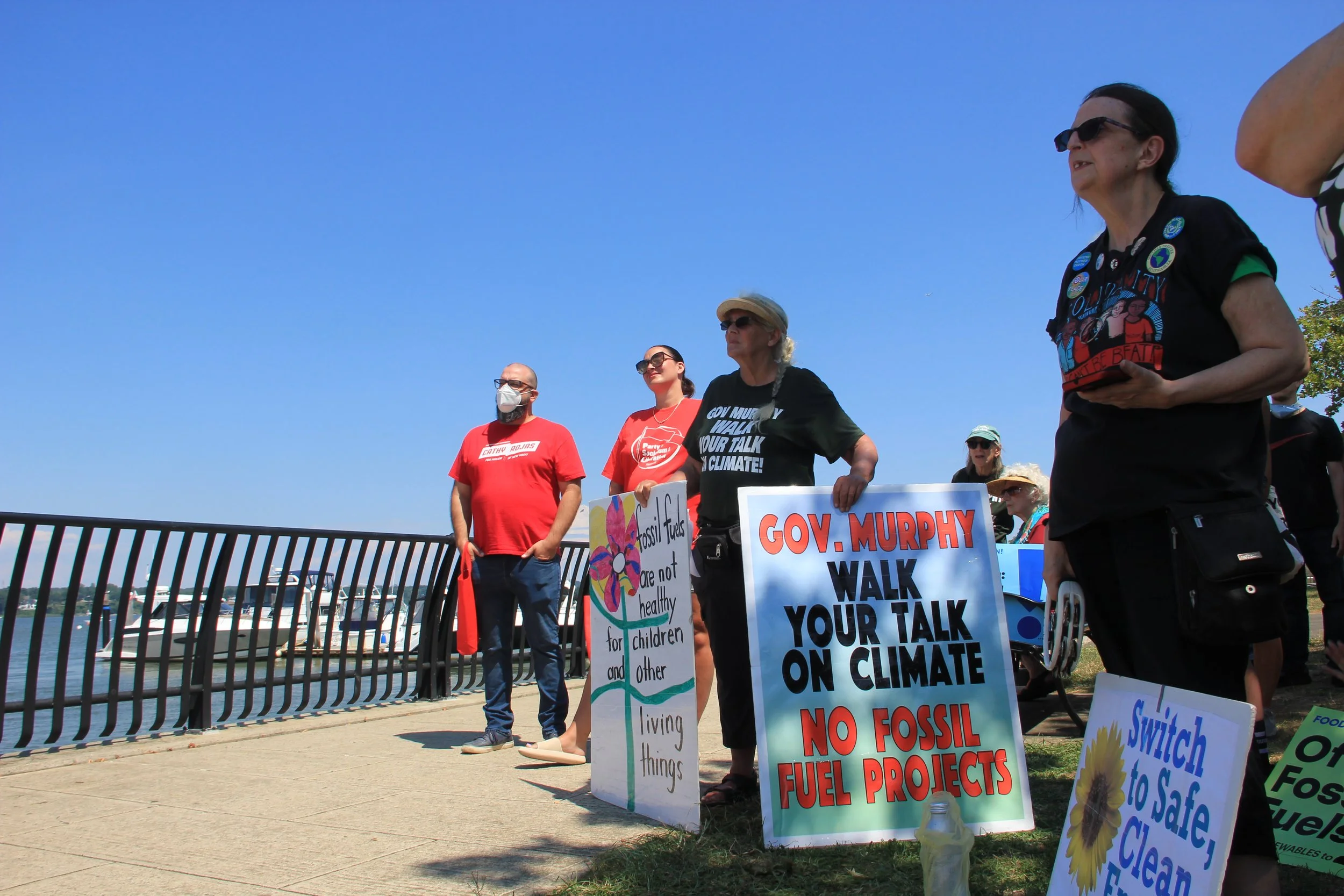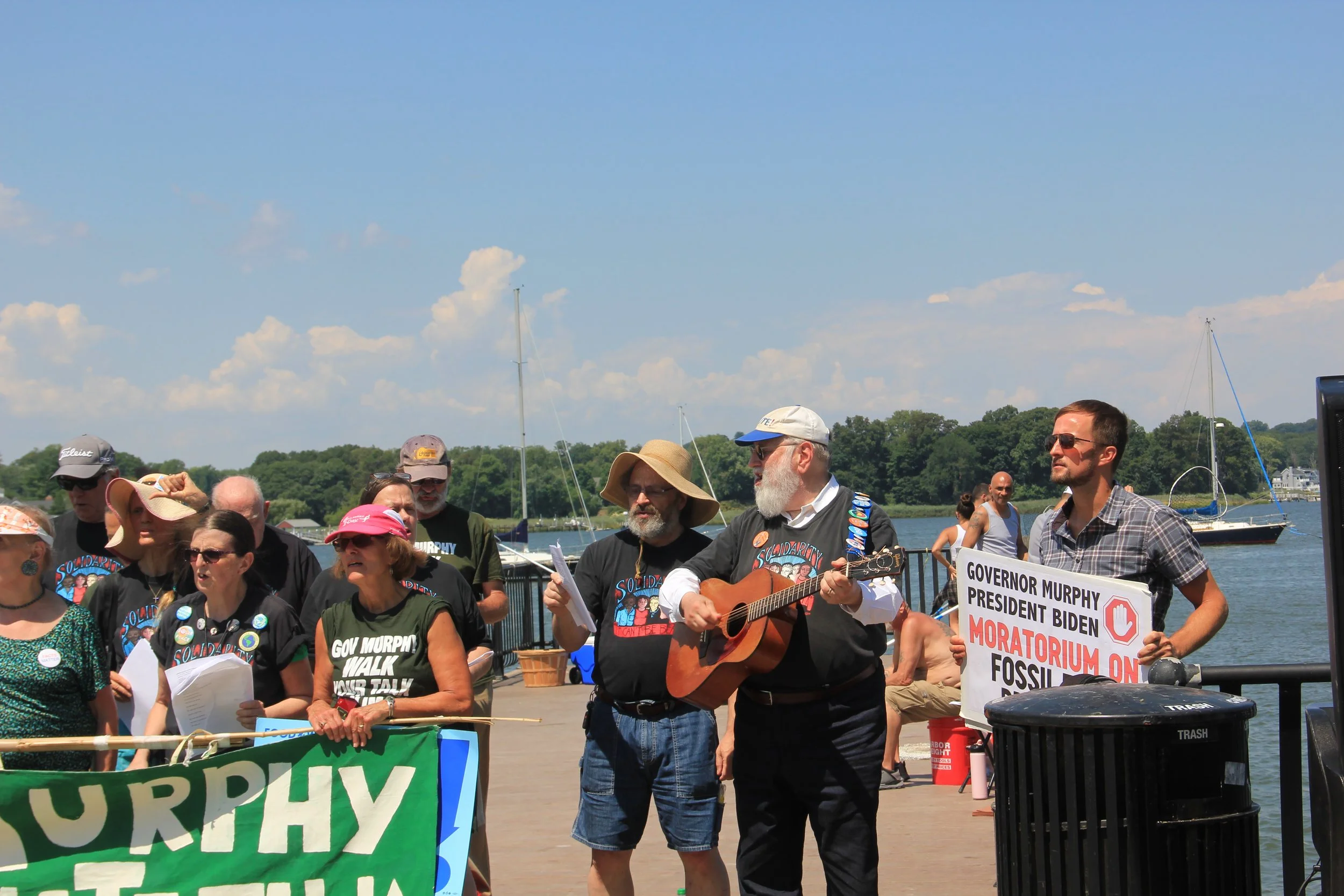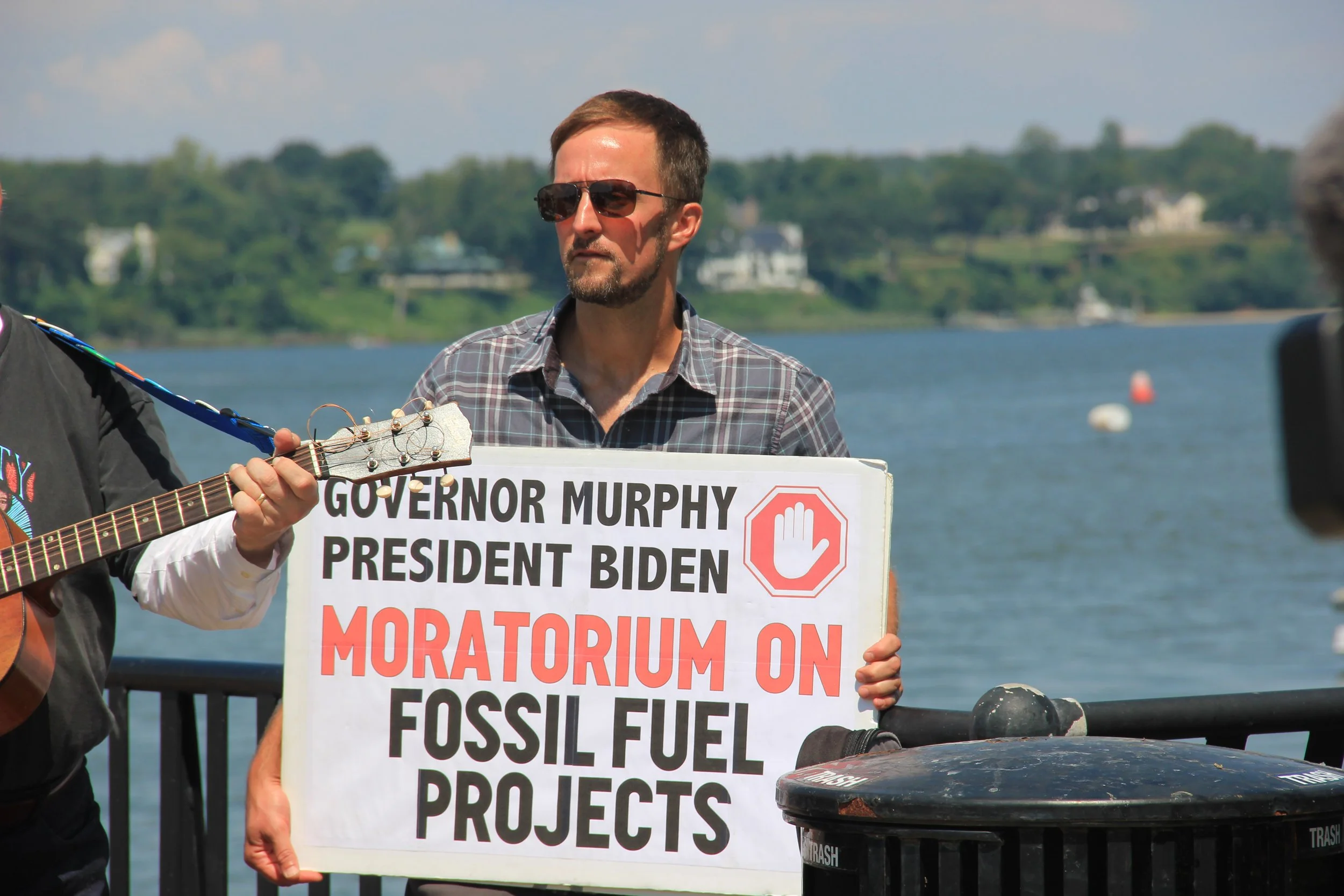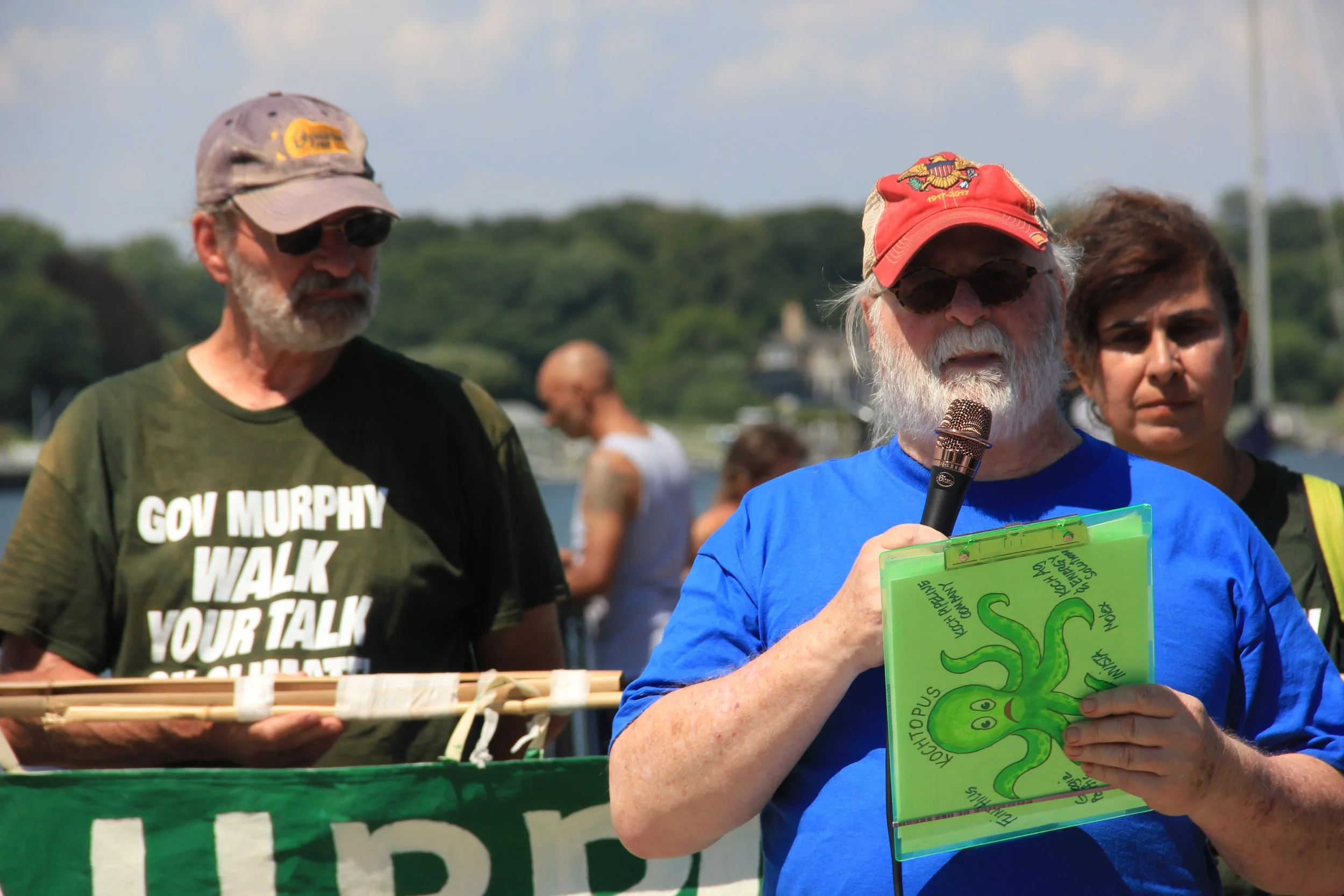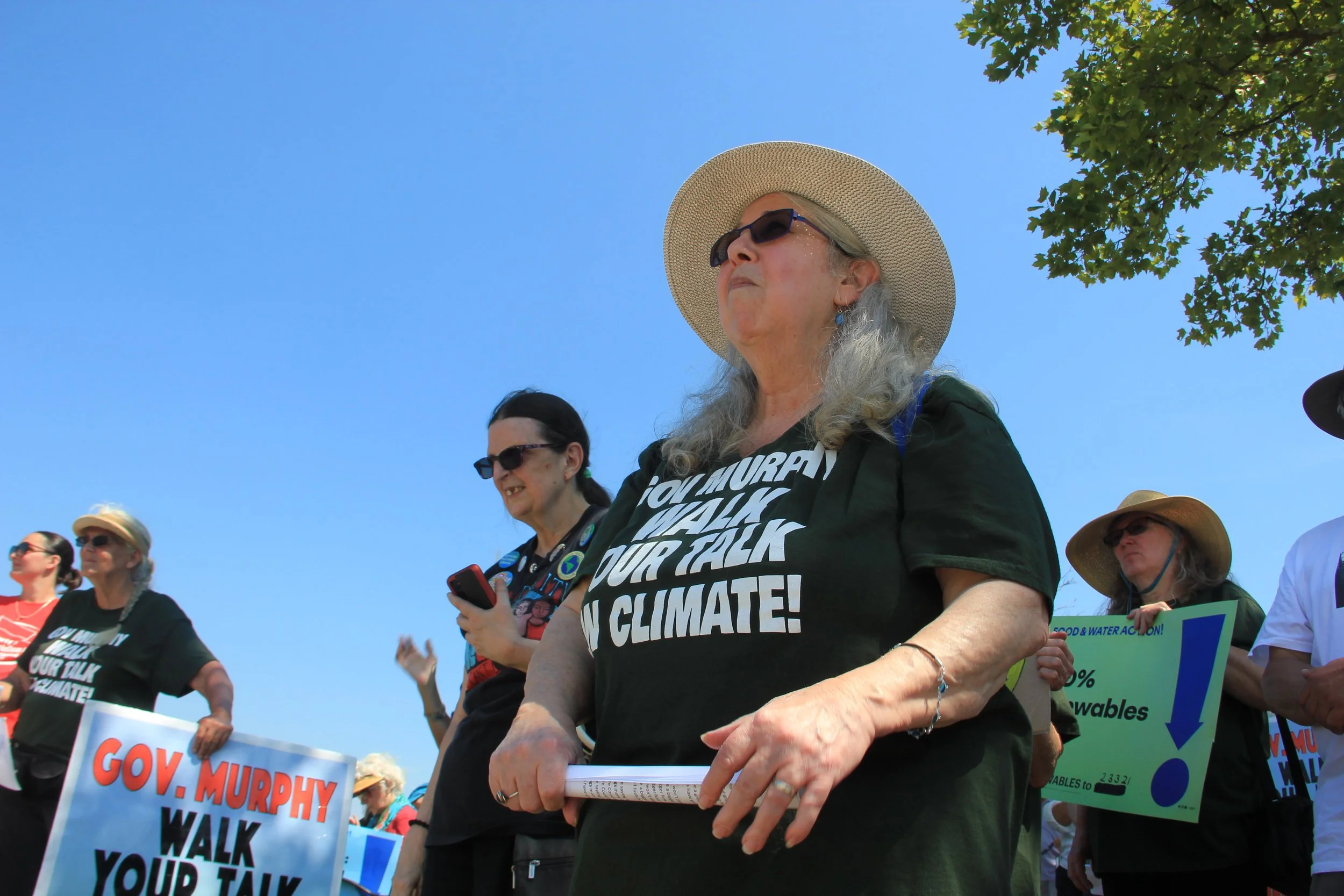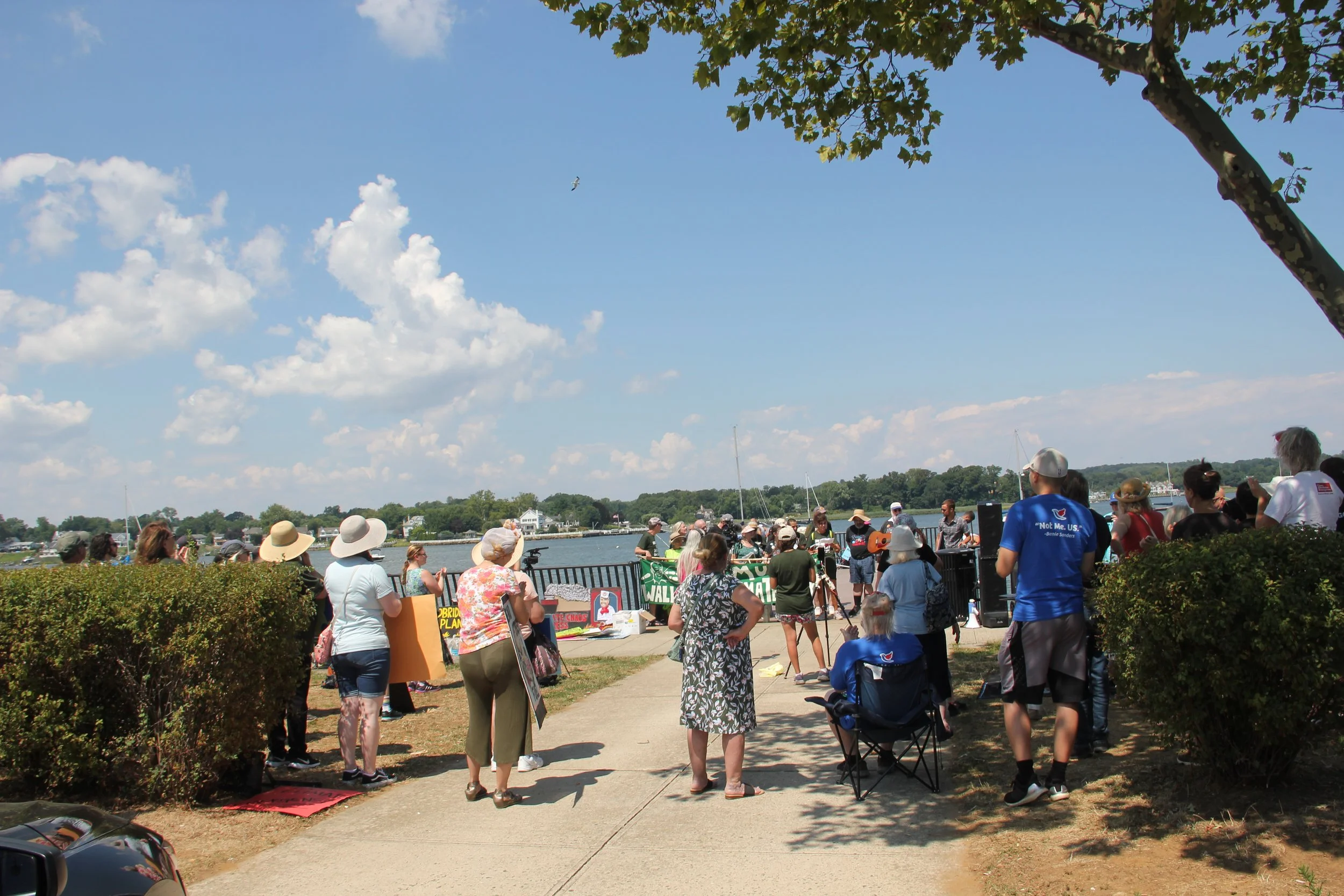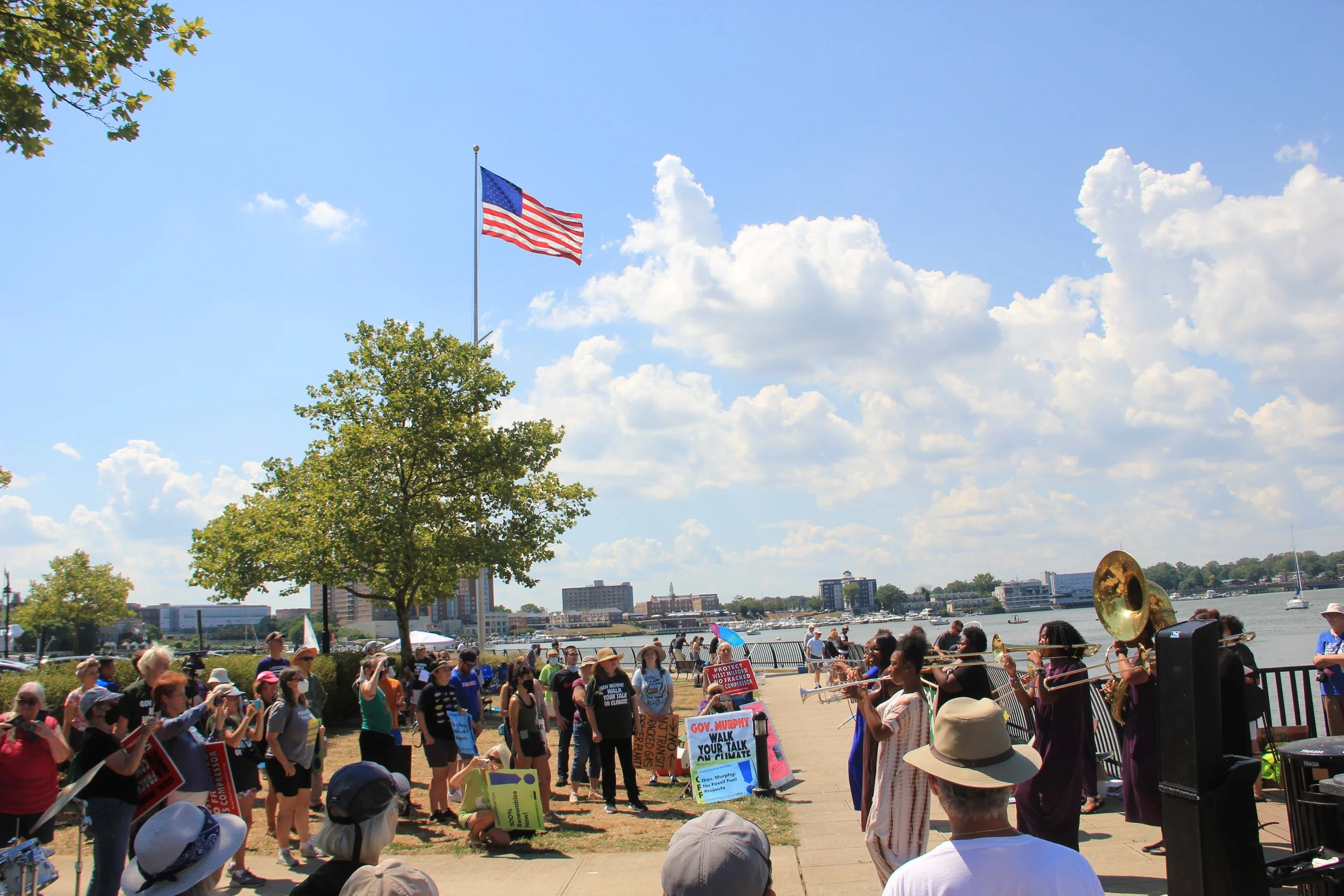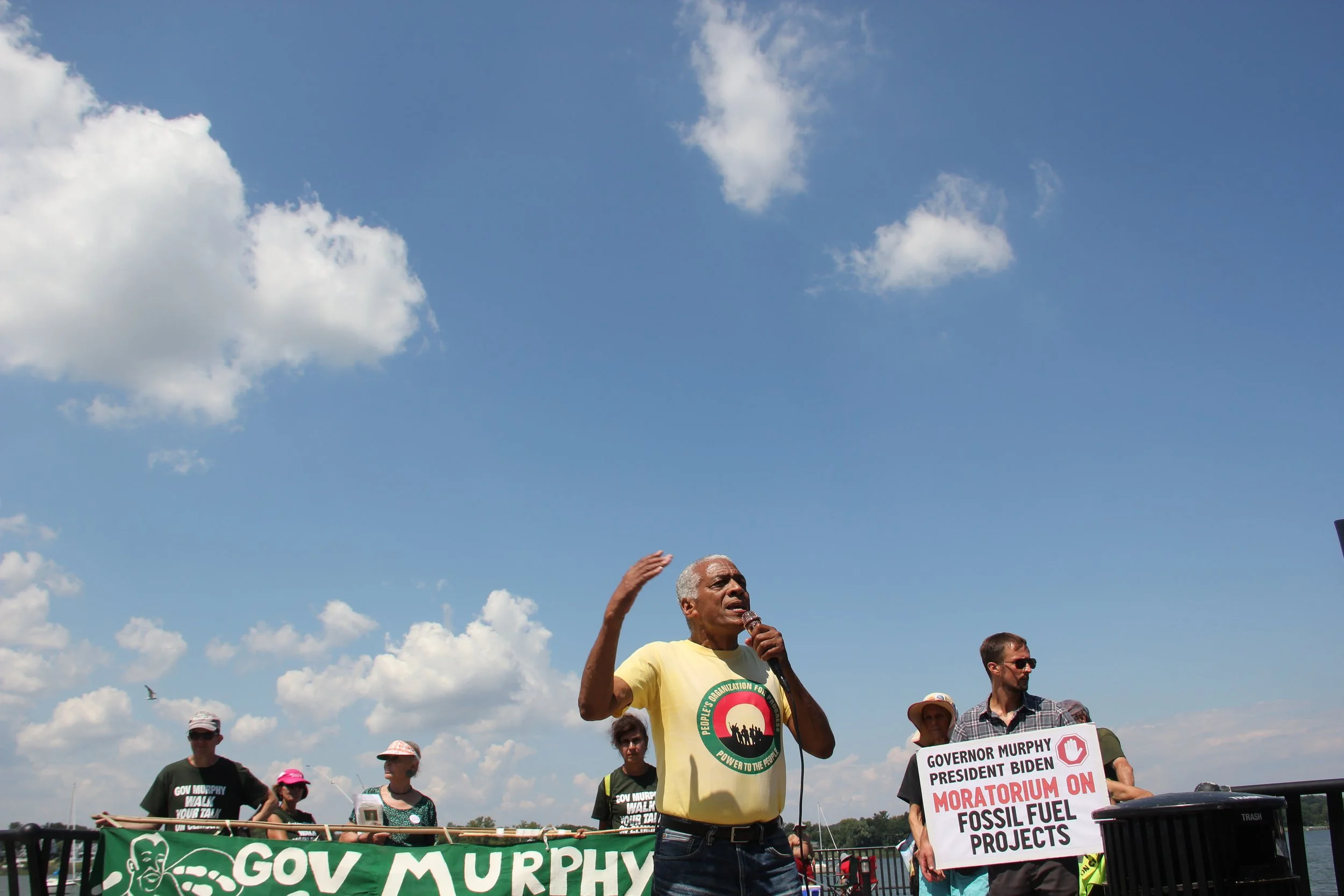Historic Five Day March Calls on Gov. Murphy to ‘Walk His Talk on Climate’
A poster held by a protestor at the ‘Walk Your Talk on Climate’ march in Newark, NJ, Aug. 16. (Josie Gonsalves for Public Square Amplified)
NEWARK-REDBANK, NJ—Protestors have long been telling Gov. Phil Murphy that they want no more power plants in their neighborhoods. But recently, in a News 12 interview, the governor endorsed one of seven new proposed fossil fuel projects. Concerned activists, organizers and Environmental Justice activists say the governor isn’t keeping his promise to transition New Jersey to 100 percent clean energy by 2050, as outlined in his clean energy vision, and launched a historic five-day “Walk your Talk on Climate,” calling on Murphy to halt all fossil fuel expansion proposals in the state.
Organized and led by EmpowerNJ, a coalition of 120 local organizations, including Clean Water Action, Green Party NJ and North Jersey Sierra Club, the protestors marched 50 miles through Newark, Elizabeth, Woodbridge, Old Bridge and Red Bank—five cities that could become home to these new fossil fuel projects. A report by EmpowerNJ estimates that Greenhouse Gas (GHG) emissions can increase by an additional 38 percent if the seven projects are approved and completed.
“This stands in stark contrast to Gov. Murphy’s Executive Order (EO) 274, which calls for reducing GHG emissions 50 percent by 2030,” EmpowerNJ said in a statement.
The fossil fuel industry is responsible for the world’s largest pollution horrors, including plastic waste and carbon dioxide emissions. Not only will emissions increase without continued action, but can negatively impact community health and air quality.
Researchers have found that Particulate Matter 2.5 (PM2.5) levels—fine inhalable pollution particles—are consistently higher in areas with high Black, Asian and Hispanic/Latino populations than areas with high white and Native American populations. They also found that low-income and marginalized communities are at a higher risk of premature death from exposure to PM2.5 and that children living in neighborhoods with higher population densities, lower-income households and high poverty rates have higher asthma rates.
These disparities in health and air pollution in low-income and marginalized communities are recognized by the state and designated as overburdened communities. The New Jersey Department of Environmental Protection (NJDEP) is required under New Jersey’s Environmental Justice Law (EJ Law) to evaluate existing environmental and public health stressors when reviewing permit applications for certain facilities.
Four of the seven fossil fuel projects are already facing final permit decisions soon, all of which impact marginalized communities first. The “Walk Your Talk on Climate” march aimed to bring attention to and amplify the struggles communities are facing throughout the state for clean air, healthy communities and a rapid shift from fossil fuels to clean renewable energy solutions. For this reason, organizers chose to march through these cities.
The protestors began their walk from the Down Bottom Farms in the Ironbound neighborhood in Newark, where the Standby Power Generation Facility (SPGF) is set to be housed. The power plant was proposed by the Passaic Valley Sewerage Commission (PVSC), an agency under Murphy’s authority. If the power plant is built, it will be the fourth one in the community designated an overburdened community.
Christian Rodriguez, Urban Agriculture Manager, giving a speech at the ‘Walk Your Talk on Climate’ march in Newark, NJ, Aug. 16. (Josie Gonsalves for Public Square Amplified)
“We’re overburdened, we don’t need anymore pollution in our city, in our state,” said Christian Rodriguez, the Urban Agriculture Manager at Down Bottom Farms and longtime Newark resident. “We’re trying to move away from this pollution.”
Newark has a poverty rate of 28.3 percent and is approximately 49 percent Black or African American. Across the globe, the poor are subject to harmful particulates and greenhouse gasses that lead to premature death from heart disease, stroke, cancer and acute lower respiratory infections. Every neighborhood in Newark is classified as an overburdened community and therefore recognized as already being significantly polluted. The city is currently home to three other power plants and the largest trash incinerator in the state—fossil fuel expansion will augment environmental racism in the city.
The second day of the walk had protestors rallying at Newark's New Jersey Transit Headquarters, opposing the New Jersey Transit Microgrid (NJTRANSITGRID) power plant in Kearny. The proposed goal of the power plant is to provide power to key NJ Transit facilities. Environmentalists have long been urging New Jersey to halt the Kearny gas-powered plant, as Kearny is already a heavily industrialized area with poor air quality and recognized as overburdened by the state.
“We’re all fighting for the same thing, it’s a shame that in 2022 you have to fight for respect,” said Terrance Bankston, an Environmental Justice Organizer for Clean Water Action. “When you come from places like Newark, it’s a different kind of disrespect, it’s a different kind of devastation that we endure when we allow major corporations with our government’s permission to complete extortion and not just behind our back but in front of our faces.”
Murphy ordered NJ Transit to come up with a renewable energy-based plan in 2020, but officials claim that renewable energy is not advanced enough to support the mass transit system and that fossil fuels are necessary to keep the transit system operational.
“And if you want to challenge me on that, I encourage you to point me to a mass transit system somewhere on the planet that can generate the power and has the storage capability to operate when the sun isn’t shining,” said NJ Transit board member, Bob Gordon.
The governor and supporters of the project argue that if approved, this facility will create jobs. But protestors say these “bad jobs” are not worth their health.
Terrence Bankston giving a speech at the ‘Walk Your Talk on Climate’ march in Newark, NJ, Aug. 16. (Josie Gonsalves for Public Square Amplified)
“It’s extortion for corporations to come in and say ‘no, but we’re going to give you these good jobs,’ they call them, we call them bad jobs,” Bankston added. “Any job that compromises our health, any job that compromises our living conditions is a problem.”
Under the EJ Law, major polluting facilities such as gas-fired power plants are required to evaluate environmental pollution and public health impacts. Although regulations under the law are still under review, New Jersey is the first state in the country to require mandatory permit denials if an environmental justice analysis finds that a new facility will disproportionately impact an overburdened community.
As part of his clean energy vision, Murphy said that the state will take aggressive action to establish an economy that invests in communities, ensures environmental justice for all residents, improves public health and “leads the way in the global clean-energy transition.”
On the third day of the walk, protestors marched toward the New Jersey Turnpike Authority Headquarters in Woodbridge to Old Bridge. They rallied against a 4.7 billion dollar project titled the Newark Bay-Hudson County Extension (NB-HCE), which will widen 60 miles of the turnpike in Hudson County and 64 miles along the Parkway.
“It’s quite ambitious. It’s needed,” Murphy told News 12 New Jersey. Murphy claims that the expansion will make way for electric cars and other green options, defending his point by stating that he has built electric car charging stations at highway rest stops and still aims to make New Jersey run on 100 percent clean energy by 2050. But fossil fuel expansions and the power plants his administration is proposing and supporting seem to contradict his goal.
The expansion aims to alleviate traffic heading into the Holland Tunnel, but EmpowerNJ says the Murphy administration isn’t taking its climate goals seriously. Sam DiFalco, a North Jersey Organizer for Food & Water Watch and lead organizer of the march, said all the project would do is shift the traffic jam into downtown Jersey City, where most neighborhoods and districts are overburdened.
"The Holland Tunnel isn't getting any wider, and Canal Street on the other side in New York is not getting any wider," said DiFalco. "So, all this is going to do is just take the traffic jam and push it now into the community."
Traffic is a significant source of air pollution in urban areas, and the transportation sector in New Jersey accounts for 42 percent of the state’s net greenhouse gas emissions. Diesel exhaust is a widespread problem with higher levels near major roadways. In Jersey City, almost 19 percent of the population lives within 1000 feet of heavy traffic, and diesel exhaust may contribute to as much as 70 percent of the cancer risk from toxic air pollution in urban areas.
One of the key strategies laid out in Murphy’s clean energy plan is reducing energy consumption and emissions from the transportation sector. As of 2020, the Healthy Community Planning Report states that truck and rail traffic transporting materials in Jersey City creates air pollution, noise and dust, all of which can be a nuisance to the community.
On the fourth day, activists and residents covered 12 miles, from Old Bridge to Middletown. There are plans to expand the Williams Transco gas pipeline that runs from South Jersey to Central Jersey. The project is called the Regional Energy Access Expansion (REAE) pipeline and will also lead to the construction of a natural gas compressor station in West Deptford and compressor station expansions in Branchburg and Old Bridge.
Pipelines release fracked gasses that are known to be radioactive and contain heavy amounts of benzene and methane. Benzene is a colorless gas known to cause cancer, and methane gas has more than 80 times the warming power of carbon dioxide during the first 20 years after it reaches the atmosphere.
Although health impacts and emissions from compressor stations are understudied, existing research has identified them as sources of air pollutants such as nitrogen dioxide, carbon monoxide, volatile organic compounds (VOCs), semi-volatile organic compounds (SVOCs), formaldehyde and particulate matter (PM). Residents who live near compressor stations have also reported experiencing health effects such as chronic respiratory, cardiovascular and neurological issues.
“This project represents an unnecessary health and public safety risk to families and businesses in the communities surrounding the dirty fossil fuel compressors, many of whom have already been forced to bear the brunt of climate change and pollution,” said Ed Potosnak, Executive Director of New Jersey League of Conservation Voters.
Along with increased emissions and pollution, pipelines increase dependence on fossil fuels during a time when fossil fuels shouldn't be in use. As Murphy promised, New Jersey residents and activists want the state to transition to renewable energy to curb emissions.
The march culminated in Red Bank, where protestors assembled across from Murphy’s home with banners labeled “Governor Murphy, Walk Your Climate Talk.” The protestors stood, cheering the different speakers as they urged Murphy to take action by halting all proposed and pending fossil fuel projects.
“It’s hard to tear down the walls, but tear down the walls we must,” said Lawrence Hamm, Chairman of the People’s Organization for Progress (POP), “We must. We don’t need any more fossil fuel power plants in Newark. We don’t need them in Kearny. We don’t need them in Woodbridge. We don’t need them anywhere.”

